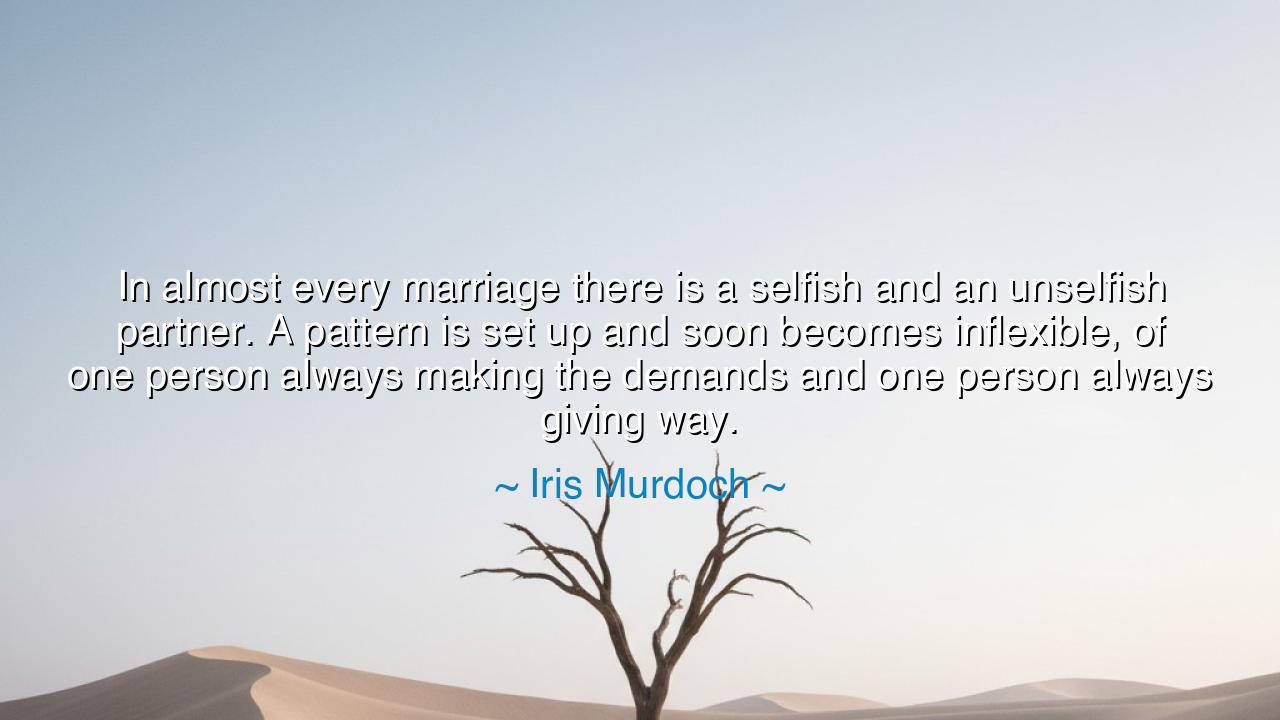
In almost every marriage there is a selfish and an unselfish
In almost every marriage there is a selfish and an unselfish partner. A pattern is set up and soon becomes inflexible, of one person always making the demands and one person always giving way.






“In almost every marriage there is a selfish and an unselfish partner. A pattern is set up and soon becomes inflexible, of one person always making the demands and one person always giving way.” Thus spoke Iris Murdoch, philosopher and novelist, whose insight into the human soul was as piercing as a sword. In this observation she unmasks a truth often hidden beneath the smiles of couples: that marriage, while sacred and filled with beauty, can fall into patterns of imbalance. One grows accustomed to taking, the other to yielding, and what began as love risks becoming submission on one side and dominance on the other.
The ancients knew this danger. In the household codes of Rome and Greece, balance was urged—husbands to love, wives to honor, both to share in duty. Yet too often, the balance tipped, and selfishness became the quiet tyrant of the home. Murdoch speaks to this ancient ailment: that when roles of taker and giver harden into inflexible patterns, the union ceases to be a partnership of equals and becomes instead a stage where one thrives at the other’s expense.
Consider the tragic marriage of Leo Tolstoy and Sofya Tolstaya. At first, their union was filled with passion, collaboration, and mutual devotion. But as years passed, Tolstoy, the great writer, demanded more—more silence, more service, more sacrifice—while Sofya gave and gave, raising their many children, copying his manuscripts by hand, and surrendering her own dreams. Their love, though real, was marred by the imbalance Murdoch describes: one selfish, one unselfish, the pattern becoming a prison that neither could escape.
Murdoch’s words, however, are not condemnation but illumination. She reminds us that such patterns do not spring from malice alone but from the gradual erosion of vigilance. At first, one partner yields out of kindness, the other demands out of need; but repeated again and again, kindness becomes habit, habit becomes expectation, and expectation becomes chain. This is the slow tragedy of many unions—not explosive betrayal, but the quiet ossification of imbalance.
And yet, her wisdom also offers hope. For if the pattern is seen, it can be broken. Unselfishness is noble, but when it becomes servitude, it ceases to be love. Selfishness is natural in moments, but when it becomes rule, it corrupts the bond. True marriage requires the courage of both: the selfish must learn to yield, the unselfish must learn to stand. Only then can the union breathe again, alive with the mutuality that gives marriage its enduring power.
The lesson for us is plain: beware the patterns you form in love. Do not allow generosity to become silence, nor affection to become entitlement. Each act of taking must be balanced by giving; each act of yielding must be met with gratitude. The ancients would call this the virtue of temperance, the middle way that keeps the scales of love from tipping into oppression.
Practical wisdom follows: speak often with your partner about the hidden balance of your union. Ask yourself: do I take more than I give? Do I yield so often that I lose myself? Restore balance through small acts—sharing decisions, dividing burdens, offering gratitude. For the health of a marriage lies not in one always bending and the other always standing tall, but in both learning the dance of give and take, of sacrifice and rest, of power and humility.
Thus Iris Murdoch’s words, spoken with the clarity of a seer, remind us that love must be guarded against the creeping chains of habit. Selfishness and unselfishness may always exist in tension, but when both partners watch with care, the pattern need not become prison. Let every union strive toward this wisdom: not the dominance of one and the surrender of the other, but the harmony of two souls walking side by side, each sometimes leading, each sometimes yielding, both forever bound in love.






AAdministratorAdministrator
Welcome, honored guests. Please leave a comment, we will respond soon